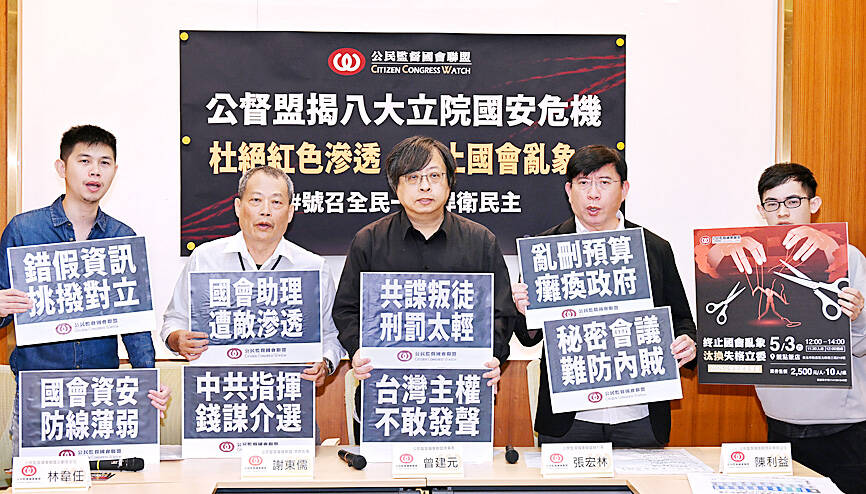Taiwan is facing severe national security threats due to enemy infiltration and espionage activities inside the legislature, Chinese funding to meddle in elections and influence politicians, and lawmakers colluding to slash the government’s fiscal budget and blocking bills to enhance safeguards for Taiwanese sovereignty, Citizen Congress Watch (CCW) said yesterday.
Unlike the US’ bicameral congress, Taiwan has a unicameral legislature, placing national sovereignty at a greater risk, “because all legislative bills, government budgets and top official appointments need only to be approved by [a single-house] legislature, and when it is involved in a security breach, the government and society as a whole are in danger,” CCW director Chang Hung-Lin (張宏林) told a news conference in Taipei.
“This past year, we saw two opposition parties acting to betray the interests of this country and its people... We also have had multiple cases of infiltration targeting lawmakers and their aides to spy for China,” Chang said.

Photo: Fang Bin-chao, Taipei Times
CCW’s main work is to monitor and evaluate the performance of lawmakers, but the Chinese Nationalist Party (KMT) and the Taiwan People’s Party (TPP) have refused to cooperate, he said.
CCW executives listed eight major national security crises in Taiwan’s legislative system: enemy infiltration into lawmakers’ offices and their aides to spy for China; disinformation campaigns to sow conflict in the legislature; Chinese money being channeled into Taiwan to interfere in elections and buy influence; courts handing out too lenient sentences on Chinese espionage cases; too few legislators speaking up for Taiwanese sovereignty; opposition parties slashing budgets to paralyze the ruling party; a lack of awareness and safeguards for information security in the legislature; and failure to stop leaks of classified information during legislative meetings to discuss military affairs, weapons procurement and national security issues.
CCW chairman Tseng Chien-yuan (曾建元) presented a “list of worst legislators” whose actions have undermined national security and betrayed Taiwan’s interests by using legislative procedures and underhanded ploys to impede the progress of important bills to boost defense spending and safeguard Taiwan from Chinese infiltration and leaking of state secrets.
Topping the list is KMT Legislator Lin Shih-ming (林思銘), who blocked 124 national security-related bills this legislative session.
TPP legislators Lin Kuo-cheng (林國成) and Huang Kuo-chang (黃國昌) tied for second place, as both blocked 110 national security-related bills, while KMT Legislator Hung Meng-kai (洪孟楷) placed fourth for blocking 41 such bills.
They were followed in descending order by KMT Legislator Wang Hung-wei (王鴻薇), who blocked 25 similar bills, and three KMT legislators-at-large — Weng Hsiao-ling (翁曉玲), Wu Tsung-hsien (吳宗憲) and Lin Chien-chi (林倩綺), who blocked 24, 23 and 23 such bills respectively, Tseng said.

SECURITY: As China is ‘reshaping’ Hong Kong’s population, Taiwan must raise the eligibility threshold for applications from Hong Kongers, Chiu Chui-cheng said When Hong Kong and Macau citizens apply for residency in Taiwan, it would be under a new category that includes a “national security observation period,” Mainland Affairs Council (MAC) Minister Chiu Chui-cheng (邱垂正) said yesterday. President William Lai (賴清德) on March 13 announced 17 strategies to counter China’s aggression toward Taiwan, including incorporating national security considerations into the review process for residency applications from Hong Kong and Macau citizens. The situation in Hong Kong is constantly changing, Chiu said to media yesterday on the sidelines of the Taipei Technology Run hosted by the Taipei Neihu Technology Park Development Association. With

‘FORM OF PROTEST’: The German Institute Taipei said it was ‘shocked’ to see Nazi symbolism used in connection with political aims as it condemned the incident Sung Chien-liang (宋建樑), who led efforts to recall Democratic Progressive Party (DPP) Legislator Lee Kun-cheng (李坤城), was released on bail of NT$80,000 yesterday amid an outcry over a Nazi armband he wore to questioning the night before. Sung arrived at the New Taipei City District Prosecutors’ Office for questioning in a recall petition forgery case on Tuesday night wearing a red armband bearing a swastika, carrying a copy of Adolf Hitler’s Mein Kampf and giving a Nazi salute. Sung left the building at 1:15am without the armband and apparently covering the book with a coat. This is a serious international scandal and Chinese

A US Marine Corps regiment equipped with Naval Strike Missiles (NSM) is set to participate in the upcoming Balikatan 25 exercise in the Luzon Strait, marking the system’s first-ever deployment in the Philippines. US and Philippine officials have separately confirmed that the Navy Marine Expeditionary Ship Interdiction System (NMESIS) — the mobile launch platform for the Naval Strike Missile — would take part in the joint exercise. The missiles are being deployed to “a strategic first island chain chokepoint” in the waters between Taiwan proper and the Philippines, US-based Naval News reported. “The Luzon Strait and Bashi Channel represent a critical access

COUNTERINTELLIGENCE TRAINING: The ministry said 87.5 percent of the apprehended Chinese agents were reported by service members they tried to lure into becoming spies Taiwanese organized crime, illegal money lenders, temples and civic groups are complicit in Beijing’s infiltration of the armed forces, the Ministry of National Defense (MND) said in a report yesterday. Retired service members who had been turned to Beijing’s cause mainly relied on those channels to infiltrate the Taiwanese military, according to the report to be submitted to lawmakers ahead of tomorrow’s hearing on Chinese espionage in the military. Chinese intelligence typically used blackmail, Internet-based communications, bribery or debts to loan sharks to leverage active service personnel to do its bidding, it said. China’s main goals are to collect intelligence, and develop a